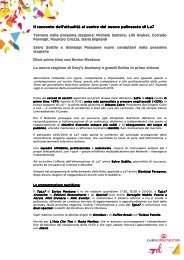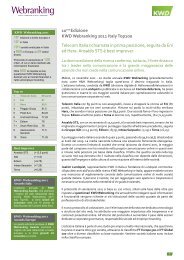What We Know About the Business of Digital Journalism
What We Know About the Business of Digital Journalism
What We Know About the Business of Digital Journalism
You also want an ePaper? Increase the reach of your titles
YUMPU automatically turns print PDFs into web optimized ePapers that Google loves.
The Story So Far: <strong>What</strong> <strong>We</strong> <strong>Know</strong> <strong>About</strong> <strong>the</strong> <strong>Business</strong> <strong>of</strong> <strong>Digital</strong> <strong>Journalism</strong>For all that, digital audiences usually far outnumber those from a traditionaloutlet. As a result, <strong>the</strong> industry faces a perplexing set <strong>of</strong> questions: Why do somany digital users generate so little advertising revenue? Is it simply that digitalsystems are more efficient than <strong>the</strong> previous oligopolies <strong>of</strong> <strong>the</strong> print and broadcastworld? Or is <strong>the</strong>re something more fundamentally askew about <strong>the</strong> waymedia companies make money <strong>of</strong>f digital customers? And, more importantly,what should publishers be doing to make <strong>the</strong> most <strong>of</strong> <strong>the</strong> readers and viewers<strong>the</strong>y have?* * *At its most basic level, advertising is a numbers game. A news organizationneeds a certain number <strong>of</strong> readers or viewers, and <strong>the</strong> more it gets, <strong>the</strong> more adsit can sell and <strong>the</strong> more it can charge those advertisers. Users also spend varyingamounts <strong>of</strong> time with <strong>the</strong> magazine, newspaper or broadcast, and <strong>the</strong> more time<strong>the</strong>y spend, <strong>the</strong> more an advertiser values <strong>the</strong> audience.<strong>Digital</strong> platforms, thanks to <strong>the</strong>ir ubiquity and ease <strong>of</strong> use, are terrific at <strong>the</strong>first part <strong>of</strong> <strong>the</strong> numbers game. News sites have demonstrated <strong>the</strong> ability to attracthuge numbers <strong>of</strong> users. And in <strong>the</strong> first decade <strong>of</strong> <strong>the</strong> digital era, particularly assearch engines became more powerful, publishers and broadcasters focused onbuilding a mass audience. They poured resources into search engine optimization—<strong>the</strong>term used to describe a way to improve <strong>the</strong> odds that headlines will bepicked up by Google or o<strong>the</strong>r search sites and that topics will be timely enoughto appear prominently on a results page. News sites initially welcomed aggregators,such as Drudge Report and Huffington Post, that linked to <strong>the</strong>ir materialand increased traffic.As a consequence, audience sizes swelled, and publishers have proclaimed thatto be a success. So when <strong>the</strong> Los Angeles Times in March 2011 logged a record195 million page views, clicked on by 33 million users, <strong>the</strong> site’s managing editortook a moment to proudly announce those statistics on <strong>the</strong> site. 422
















